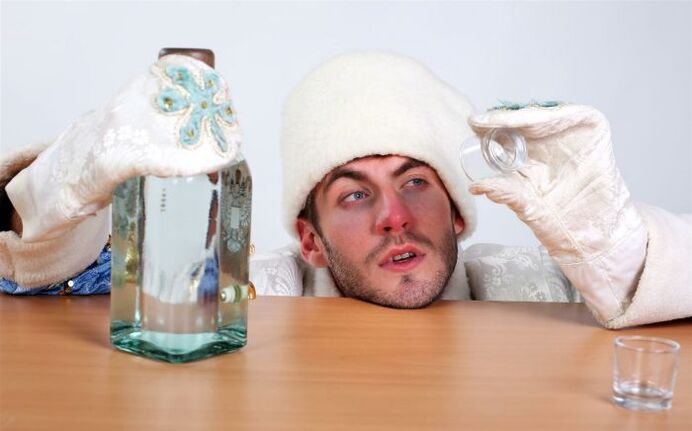Alcoholism is one of the most discussed topics. It threatens family relationships and society as a whole. It is not surprising that after some time the patient's family members wonder how to get the person to stop drinking.
Reasons for alcohol addiction
Before discovering how to help a person stop drinking, you need to understand why they drink. By isolating the root cause, you have a better chance of curing the person's persuasion. Most often, the onset of alcoholism is a psychological addiction, so it is important to help the person understand that it is an addiction, not a habit. In most cases, there are four reasons why people start drinking:
- to the company;
- relieve stress;
- boredom;
- out of habit.
A popular reason that a person begins to suffer from alcoholism is to drink for the company. Being the only teetotaler among friends, it is difficult to maintain an inflexible attitude. For some, especially teens, it is an honor to support the company in an effort.

When a person is not surrounded by a rainbow environment and has constant problems at work, she begins to drink alcohol to alleviate this stressful pressure. When drinking strong feelings, negative emotions, it may seem for a second that the problem does not exist. In fact, it won't disappear anywhere if you don't make up your mind about it. As a result, a possible exit in such a situation must be traveled. As soon as the intoxication passes, the person re-immerses himself in negative emotions, concluding that to avoid them he should not stop drinking.
Drinking out of boredom is a vague concept. This is not a short-term situation where one person has nothing to do. We are talking about a long period of time during which a person is faced with a situation that does not allow him to use force, to focus on something specific. Most often in this state, a mechanism is activated that helps to reconcile with oneself.
The most dangerous reason why it is difficult to answer the question of how to help an alcoholic to stop drinking is habitual alcoholism. In this case, it is difficult for a person not to drink, since the habit has become everyday for him and it is already difficult to imagine her life without it. In this case, the motivation to stop drinking must be very serious, otherwise it is almost impossible to convince a person to stop drinking.

It is often very difficult to pinpoint a single reason for the origin of addiction. All of this is closely intertwined and works together. When alcoholism reaches its final stage, we are talking about a physical desire for alcohol. In this case, help for alcoholism without medication is impossible. If a person wants to get rid of the disease, this will be of great help in further treatment.
Does persuasion work?
How to cure an alcoholic? In fact, there are many ways to discourage a person from drinking. The most popular way is to persuade and persuade the person to stop drinking alcohol. This is a gentler way to help you.
It can make an alcoholic quit smoking in more radical ways; this is a nervous shock after drinking. This segment also includes patient intimidation. The third sector of assistance is the addition of various medicines or home remedies to food. Before understanding how to help a drinking person to stop drinking, it is worth finding out what form of alcoholism is going to bed, what exactly causes the person to become addicted.

Since adding some medicinal or folk remedies to food is a very radical method that requires caution and prior consultation with a doctor, it is worth starting with gentler methods, in particular, it should help the alcoholic with conversations.
During these conversations, it is worth trying to get the person to stop drinking alcohol. The most effective ways to persuade an alcoholic to be treated will be in the first stage of alcoholism, when the person has not yet lost the ability to critically perceive reality.
Before starting a conversation, think about the facts that you will give the alcoholic. If you see how awful he looks from the side while drunk, maybe this will push you to make radical decisions. You may want to quit already, but your willpower won't allow it due to the lack of a "really important" reason.
How to convince an alcoholic of the harmfulness of her habit? Better to get family or friendly advice. In the circle of this conversation there should be only the closest people that the person trusts. In the first stage, it is easy to wean a person from alcohol. Just tell him about his drunken behavior, show him a tape from a recent party. If a person has not yet lost the ability to think properly, he will be frightened and ashamed of his behavior, putting an end to drinking.

It would be good to remind him of a hangover, especially when he does not allow him to spend time with his family or how he likes the sick person. It is important to maintain any habit, which means spending money on it. Make calculations by expressing them on trips to the movies, kiddie walks, and other activities.
It is important to prepare in advance for the fact that your attempts to figure out how to make him stop drinking will be met with hostility, resentment and disputes. In this case, it is very important to remember the answer to the question. Is it possible to burst into tears or, on the contrary, freely accept the conditions raised by the patient? In no case. It is better to explain in a calm voice that no one will force anyone, but why not pay attention to the available alternatives.
If you managed to get away from the theory of how to convince a person to be treated for specific results, then in no case do not abandon him in such a situation. He continues to support, perhaps he himself does not know how to free himself from addiction. Not everyone can stop drinking at home. Find a suitable clinic, make an appointment with a doctor, help the person to get there. A person who stops drinking needs help more than ever.
Other options
One of the undesirable options is bullying, if you are thinking about how to help, quitting drinking is very difficult and there is additional stress as well. It should be understood that this working technique can lead to the opposite effect.
This method is suitable only for those patients who correspond to a certain psychotype. Some may perceive this behavior aggressively, which is clearly not the best reaction.
Not always persuasion, arguments, intimidation work. Sometimes this is not enough if the alcoholism has already progressed to a deeper stage. In this case, you need to use special drugs. These can be common medications or something from popular recipes.
With the help of industrial pharmacology drugs, it is possible to form a feeling of aversion to alcohol in a person who drinks. Such methods are available even if a person does not know that he accepts them, although the desire to get rid of the addiction directly helps to achieve more.

Drugs are added to alcohol or food. This often leads to a deterioration in well-being immediately after drinking alcohol. After a couple of such cases, the alcoholic begins to associate the bad condition with alcohol and thinks about stopping drinking.
Medications used for such purposes contain disulfiram or cyanamide. As a result, the body cannot process ethyl alcohol normally. There is an accumulation of decomposition products in the blood, which becomes the cause of persistent poisoning.
During this therapy, as soon as you notice the effect of the medicine, it is a good idea to have another conversation and ask the alcoholic to come in for treatment. It is important to describe the advantages of hospital treatment:
- relapse prevention;
- psychological help;
- constant monitoring of health status;
- restoration of internal damage.
The best way to get rid of addiction is treatment in a hospital, where the patient will be constantly monitored by a narcologist. The lowest number of relapses is observed with this treatment.
Stages of alcoholism
Alcoholism is generally divided into three stages, for each of which special symptoms and a number of health consequences are assumed. The first stage is more difficult in terms of identifying the problem from the person's appearance. Unbeknownst to himself and those around him, a person gradually increases the dose of what he drinks, since a certain amount of experience is acquired, which does not allow him to achieve the desired degree of intoxication with the same doses of alcohol.
Already in such a state, a person cannot stop and stop drinking, unless the corresponding problem is indicated. After a person drinks, he begins to suffer from nausea and vomiting. Very often the patient has memory lapses, he cannot remember what he did last night. The memory loss is partial.

As a result, after the first stage of alcoholism, a person is faced with a constant increase in alcohol consumption. At the same time, a drink can be repeated two or three times a week. The problem in this case is the lack of attention to a loved one and, as a result, the aggravation of the addiction.
When a person passes into the second stage of alcoholism, the external signs become more noticeable. The first binges that appear, when a person drinks alcohol relentlessly not even for two or three days, speak of the formation of second-degree alcoholism. At this point, a physical form of addiction begins to form.
The person begins to have a hangover, as this is the only way to alleviate the condition. These symptoms are clear signs of the second stage of the disease. Also, the person suffers from constant weakness, headache, dizziness, nausea, sweating. An unpleasant tremor begins to permeate the whole body, first of all it is expressed in the hands. The second stage can last for years, up to two decades, but can be limited to two years. At the final stage of the second stage, a person no longer has the opportunity to cope with the problem on his own, only a doctor will help him.
The last stage is the third. When it is formed, everyone can see a person as an alcoholic. The appearance begins to change. A person has a constantly swollen face, a kilometer from him smells of alcohol. At this time, many chronic diseases are formed, psychosis in severe form and other problems are manifested. In such a state, people, as a rule, already run out of family or are surrounded by people in the same state. In the third stage of alcoholism, a person loses his social position, the ability to think critically. In this case, it is unlikely that he will return to normal life.
























